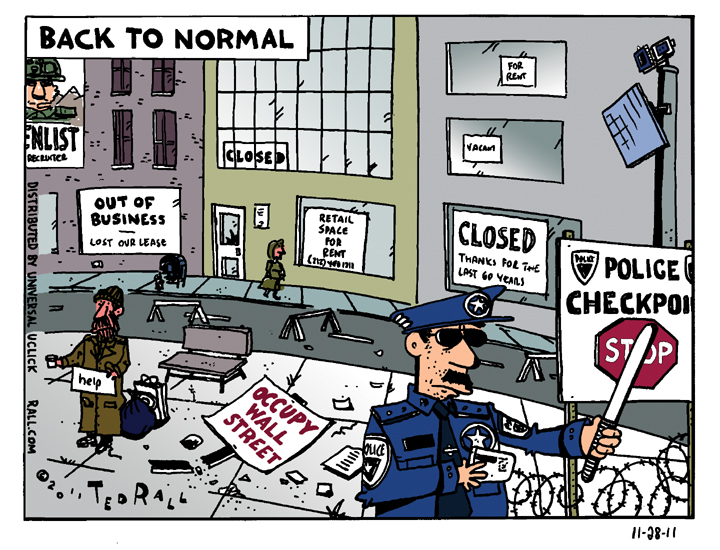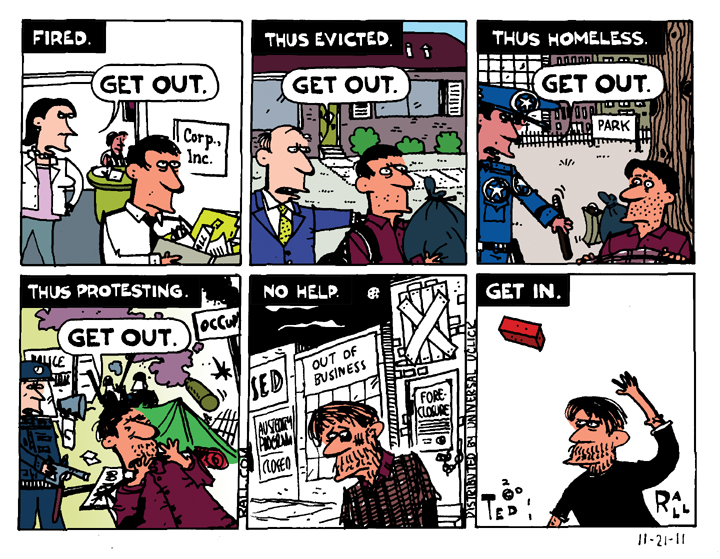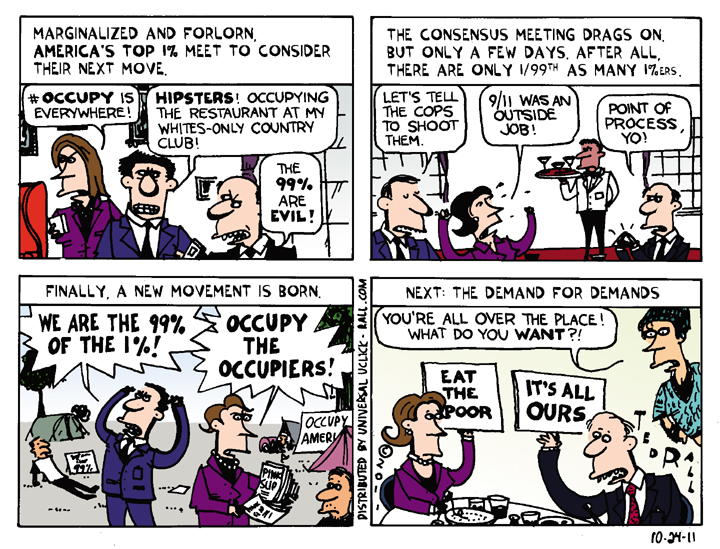MoveOn Co-opts OWS Rhetoric, Dilutes Its Message
If Democrats were doing their jobs, there wouldn’t be an Occupy movement.
The last 40 years has left liberals and progressives without a party and working people without an advocate. The party of FDR, JFK and LBJ abandoned its principles, embracing and voting along with Reagan and two Bushes. Clinton’s biggest accomplishments, NAFTA and welfare reform, were GOP platform planks. These New Democrats were indistinguishable from Republicans, waging optional wars, exporting jobs overseas and coddling corrupt CEOs while the rest of us—disconnected from power, our needs repeatedly ignored—sat and watched in silent rage.
Barack Obama is merely the latest of these phony Democrats. He’s the most recent in a line of corporate stooges going back to Jimmy Carter.
The Occupiers revolted under Obama’s watch for two reasons. The gap between the promise of his soaring rhetoric and the basic indecency of his cold-blooded disregard for the poor and unemployed was too awful to ignore. Moreover, the post-2008 economic collapse pushed a dam of insults and pain and anger that had built up over years past its breaking point.
Haphazard and disorganized and ad hoc, the Occupy movement is an imperfect, spontaneous response that fills a yawning demand gap in the American marketplace of ideas. For the first time since 1972, the spectrum of Left from liberalism to progressivism to socialism to communism to left anarchism has an audience (if not much of an organization).
Now the very same Democrats who killed liberalism and blocked leftists from candidacies, appointments, even the slightest participation in discussion—are trying to co-opt the Occupy movement.
MoveOn.org, which began as a plea for the U.S. to “move on” during Bill Clinton’s impeachment for perjury, claims to be an independent, progressive activist group. It’s really a shill for center-right Democratic politicians like Obama, whom MoveOn endorsed in the 2008 primaries against Hillary Clinton, who was running to Obama’s left.
All decision-making within the Occupations is consensus-based. Nothing gets approved or done before it has been exhaustedly debated; actions must be approved by 90 to 100% of Occupiers at General Assemblies. It can be arduous.
Without respect for Occupy’s process, MoveOn brazenly stole the movement’s best-known meme for its November 17th “We Are The 99%” event. And no one said boo.
Some Occupier friends were flattered.
Idiots.
Why didn’t MoveOn ask permission from the Occupy movement? Because they wouldn’t have gotten it. “We’re just days from the Super Committee’s deadline to propose more cuts for the 99% or increased taxes for the 1%,” reads MoveOn’s ersatz Occupy “event.”
“So come out and help increase the pressure on Congress to tax Wall Street to create millions of jobs.”
Um, no. Lobbying Congress directly contradicts a fundamental tenet of the movement that began with Occupy Wall Street. Occupy doesn’t lobby. Occupy doesn’t endorse either of the corporate political parties. Occupy doesn’t care about this bill or that amendment. Occupy does not participate in stupid elections in which both candidates work for the 1%. Occupy exists in order to figure out how to get rid of the existing system and what should replace it.
What MoveOn did was shameful. They ought to apologize. Donating a year or two’s worth of their contributions to the Occupations would be small penance. Given how little MoveOn has accomplished since its founding, Occupy would likely make better use of the cash.
On December 7th it was the turn of another Democratic “Astroturf” organization, the “American Dream Movement,” to lift the Occupy movement’s radical rhetoric to promote a very different, milquetoast agenda.
The American Dream Movement was co-founded in June 2011 by former Obama political advisor Van Jones and—turning up like a bad penny!—MoveOn.org.
A written statement for the ADM’s “Take Back the Capitol” threatened to “make Wall Street pay” for enriching the richest 1% and to “track down those responsible for crashing the economy and causing millions of 99%-ers to lose their jobs and homes—while failing to pay their fair share of taxes.”
Sounds like Occupy. Which is great.
Somewhat less than awesome is the content of the “Take Back the Capitol”: begging Congressmen who ought to awaiting trial for corruption and treason for a few crumbs off the corporate table.
“Throughout Tuesday, demonstrators visited the offices of about 99 House and Senate members, from both parties, and most were refused meetings with lawmakers,” reported NPR.
Duh.
What part of “we hate you” do these ACM fools not get?
Robert Townsend, an unemployed 48-year-old man from Milwaukee, managed to meet his Congressman, Republican Thomas Petri. “We asked him if he would vote for the jobs bill. He was evasive on that. And I asked him, ‘Tell me something positive that you’re doing for Wisconsin that will put us back to work.’ He mentioned something in Oshkosh, but that’s mostly for military people. He really didn’t have much of an answer. It’s like he had no commitment to addressing this problem.”
Double duh.
If Congress were responsive, if Democrats or Republicans cared about us or our needs, if Obama and his colleagues spent a tenth as much time and money on the unemployed as they do golfing and bombing and invading and shoveling trillions of dollars at Wall Street bankers, we wouldn’t need an Occupy movement.
But we won’t have one for long. Not if Occupy lets itself get Occupied by MoveOn and the Democrats.
(Ted Rall is the author of “The Anti-American Manifesto.” His website is tedrall.com.)
COPYRIGHT 2011 TED RALL



